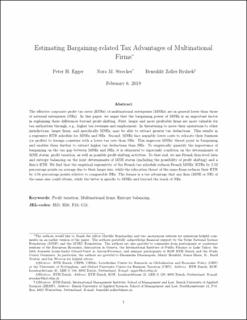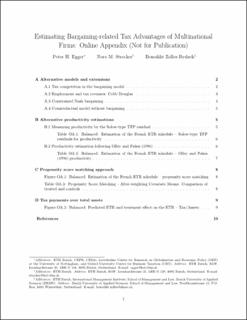Please use this identifier to cite or link to this item:
https://doi.org/10.21256/zhaw-21629| Publication type: | Article in scientific journal |
| Type of review: | Peer review (publication) |
| Title: | Estimating bargaining-related tax advantages of multinational firms |
| Authors: | Egger, Peter H. Strecker, Nora M. Zoller-Rydzek, Benedikt |
| et. al: | No |
| DOI: | 10.1016/j.jinteco.2019.103258 10.21256/zhaw-21629 |
| Published in: | Journal of International Economics |
| Volume(Issue): | 122 |
| Issue: | 103258 |
| Issue Date: | 2020 |
| Publisher / Ed. Institution: | Elsevier |
| ISSN: | 0022-1996 1873-0353 |
| Language: | English |
| Subjects: | Entropy balancing; Multinational firm; Profit taxation |
| Subject (DDC): | 332: Financial economics |
| Abstract: | The effective corporate profit tax rates (ETRs) of multinational enterprises (MNEs) are in general lower than those of national enterprises (NEs). In this paper, we argue that the bargaining power of MNEs is an important factor in explaining these differences beyond profit shifting. First, larger and more profitable firms are more valuable for tax authorities through, e.g., higher tax revenues and employment. In threatening to move their operations to other jurisdictions, larger firms, and specifically MNEs, may be able to extract greater tax deductions. This results in a regressive ETR schedule for MNEs and NEs. Second, MNEs face arguably lower costs to relocate their business (or profits) to foreign countries with a lower tax rate than NEs. This improves MNEs' threat point in bargaining and enables them further to extract higher tax deductions than NEs. To empirically quantify the importance of bargaining on the tax gap between MNEs and NEs, it is elemental to rigorously condition on the determinants of MNE status, profit taxation, as well as possible profit-shifting activities. To that end, we use French firm-level data and entropy balancing on the joint determinants of MNE status (including the possibility of profit shifting) and a firm's ETR. We find that the empirical regressivity of the French tax schedule reduces French MNEs' ETRs by 2.52 percentage points on average due to their larger size, while the relocation threat of the same firms reduces their ETR by 3.58 percentage points relative to comparable NEs. The former is a tax advantage that any firm (MNE or NE) of the same size could obtain, while the latter is specific to MNEs and beyond the reach of NEs. |
| URI: | https://digitalcollection.zhaw.ch/handle/11475/21629 |
| Fulltext version: | Accepted version |
| License (according to publishing contract): | CC BY-NC-ND 4.0: Attribution - Non commercial - No derivatives 4.0 International |
| Restricted until: | 2022-01-31 |
| Departement: | School of Management and Law |
| Organisational Unit: | International Management Institute (IMI) |
| Appears in collections: | Publikationen School of Management and Law |
Files in This Item:
| File | Description | Size | Format | |
|---|---|---|---|---|
| 2020_Egger-et-al_Estimating-bargaining-related-tax-advantages.pdf | 354.16 kB | Adobe PDF |  View/Open | |
| 2020_Egger-et-al_Estimating-bargaining-related-tax-advantages_Online-Appendix.pdf | 203.88 kB | Adobe PDF |  View/Open |
Show full item record
Egger, P. H., Strecker, N. M., & Zoller-Rydzek, B. (2020). Estimating bargaining-related tax advantages of multinational firms. Journal of International Economics, 122(103258). https://doi.org/10.1016/j.jinteco.2019.103258
Egger, P.H., Strecker, N.M. and Zoller-Rydzek, B. (2020) ‘Estimating bargaining-related tax advantages of multinational firms’, Journal of International Economics, 122(103258). Available at: https://doi.org/10.1016/j.jinteco.2019.103258.
P. H. Egger, N. M. Strecker, and B. Zoller-Rydzek, “Estimating bargaining-related tax advantages of multinational firms,” Journal of International Economics, vol. 122, no. 103258, 2020, doi: 10.1016/j.jinteco.2019.103258.
EGGER, Peter H., Nora M. STRECKER und Benedikt ZOLLER-RYDZEK, 2020. Estimating bargaining-related tax advantages of multinational firms. Journal of International Economics. 2020. Bd. 122, Nr. 103258. DOI 10.1016/j.jinteco.2019.103258
Egger, Peter H., Nora M. Strecker, and Benedikt Zoller-Rydzek. 2020. “Estimating Bargaining-Related Tax Advantages of Multinational Firms.” Journal of International Economics 122 (103258). https://doi.org/10.1016/j.jinteco.2019.103258.
Egger, Peter H., et al. “Estimating Bargaining-Related Tax Advantages of Multinational Firms.” Journal of International Economics, vol. 122, no. 103258, 2020, https://doi.org/10.1016/j.jinteco.2019.103258.
Items in DSpace are protected by copyright, with all rights reserved, unless otherwise indicated.